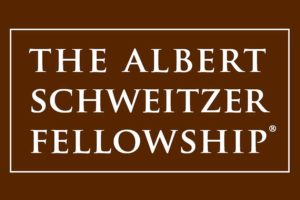 Four UAB School of Medicine students recently completed their year as Alabama Schweitzer Fellows, working to address unmet health needs through community-based projects.
Four UAB School of Medicine students recently completed their year as Alabama Schweitzer Fellows, working to address unmet health needs through community-based projects.
Founded in 2015, the Alabama Schweitzer Chapter joined a national network of Albert Schweitzer Fellowship (ASF) programs dedicated to improving the health of vulnerable people. They develop a corps of emerging professionals who enter the workforce with the skills and commitment necessary to address community health concerns.
Schweitzer Fellows develop and implement service projects that address the root causes of health disparities in underserved communities. The four School of Medicine students worked on projects within community-based service organizations in the Birmingham area.
Jacob Files
Jacob Files, Medical Scientist Training Program rising GS2, worked with the BFED (BAO Food and Education Delivery) program at Birmingham AIDS Outreach (BAO). The program collaborates with the UAB 1917 HIV Clinic to provide food boxes to food insecure, HIV-positive people in the Birmingham area.
Files expanded the program by offering more options for clients living with both diabetes and HIV. Thanks to the initiative, clients self-reported healthy lifestyle changes and learned more about diabetes management. Files also made a series of educational videos on diabetes that BAO and the 1917 Clinic will continue to use for future clients and patients. BAO and the BFED program plan on offering diabetic food boxes for diabetic clients in the future, building on Files’ expansion.
“I have gained a deeper respect for the HIV-positive clients here in the Birmingham area and the challenges they face,” Files said. “As a future health care professional, I hope I can positively impact patients and make their lives less challenging.”
Amy Hudson and Nicole Lassiter
Amy Hudson, rising MS3, and Nicole Lassiter, rising MS3, piloted a holistic diabetes education program at the Community of Hope Health Clinic in Pelham.
Lassiter grew up watching her father manage his diabetes, while Hudson, a Type 1 diabetic, has learned that each person has unique factors affecting their diabetes management.
Hudson and Lassiter developed bilingual classes focused on nutrition, exercise and stress management. After each class, participants attended one-on-one sessions to develop individualized plans to use what they learned.
The program helped five class participants reach their target A1C levels or weight loss goals, while two participants transitioned into careers more accommodating for diabetes management.
“My time as a Schweitzer fellow has been a period of growth and learning,” Lassiter said. “I’ve learned about service, community, patients and myself in the process.”
Madilyn Tomaso
Madilyn Tomaso, rising MS3, worked with the Community Food Bank of Central Alabama to improve adults’ fruit and vegetable consumption at the Food Bank’s Corner Market.
Tomaso helped create wraparound services and individualized goal monitoring. She also developed a curriculum to instruct participants on nutrition, physical activity, food waste, and other health-related topics, teaching them to make informed decisions when shopping at the market.
Working with the Food Bank’s Sumer Meal program sites, Tomaso developed a curriculum called “Summer Food, Summer Moves” that focused on choosing healthy snacks, increasing water consumption, increasing physical activity and reducing screen time.
The summer meal program site will continue the “Summer Food, Summer Moves” program for future summer activities, while the Food Bank will sustain the wraparound services that will serve as a template for future services.
“As a future physician it is my duty to learn the art of medicine, which is the balance between science and human compassion. The Schweitzer Fellowship has provided me the opportunity to develop this skill as I served my community,” Tomaso said. “As Dr. Schweitzer said, ‘The purpose of human life is to serve.’”